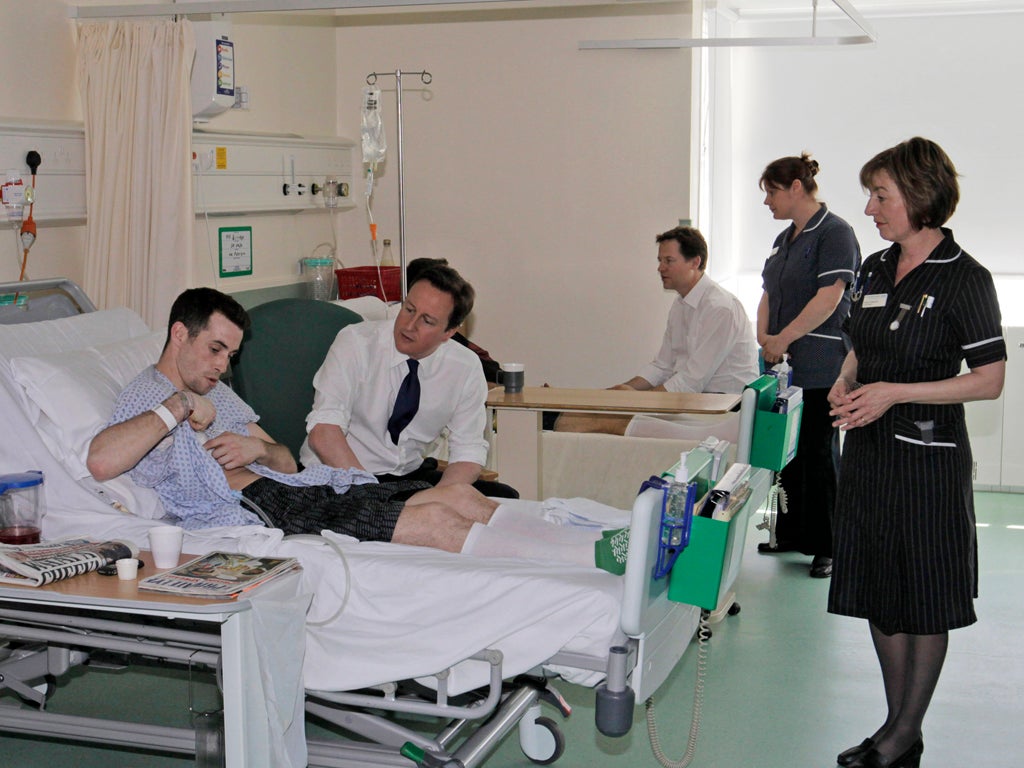I wish our politicians would stop talking about reforming the NHS and just get on and do it
Notebook: Medics and members of parliament who support change are not getting their message out - as dismal attendance of a meeting in north west London testifies


Your support helps us to tell the story
From reproductive rights to climate change to Big Tech, The Independent is on the ground when the story is developing. Whether it's investigating the financials of Elon Musk's pro-Trump PAC or producing our latest documentary, 'The A Word', which shines a light on the American women fighting for reproductive rights, we know how important it is to parse out the facts from the messaging.
At such a critical moment in US history, we need reporters on the ground. Your donation allows us to keep sending journalists to speak to both sides of the story.
The Independent is trusted by Americans across the entire political spectrum. And unlike many other quality news outlets, we choose not to lock Americans out of our reporting and analysis with paywalls. We believe quality journalism should be available to everyone, paid for by those who can afford it.
Your support makes all the difference.You can no longer assume that churches will be draughty. The Methodist church at the southern end of Marylebone seemed quite well heated, and it wasn’t thanks to the number of people there. Two dozen would be a generous estimate of those who had turned up for a consultation on the future of hospital services in North West London.
Now it may be that more people had been there earlier in the day; this was, as I had understood, a sort of rolling, drop-in, type of occasion, where interested members of the public could learn about plans to bring emergency and certain specialist services together in fewer hospitals. As every MP and local councillor knows, there’s nothing like a mooted hospital closure to bring out furious protesters. And one reason that some of these weren’t in Marylebone that afternoon was that they were in Fulham, marching against the possible ending of some services at Charing Cross Hospital.
Still, I found the turn-out disappointing, as it must have been for the hospital consultants who had given up part of their Saturday to present the plans from their perspective. Nor was it just a matter of numbers. Most of the sparse audience had some axe to grind about their treatment or their favourite consultant moving away. No case for change was ever going to be given the time of day.
The argument that, on the national scale, North West London has too many beds, in too many big hospitals, with specialists spread too thinly – which it has - is not one that this audience wanted to hear.
The truth is, though, that the medics and politicians who support change are not getting their message out, and the dismal attendance here was part of the proof. I only found out about the meeting from a note in the council’s glossy newsletter. It was one of three consultations – the other two were held at times many people would be working and at places less accessible by public transport. There is also a 70-plus page document in pure NHS-speak, with the opaque title, “Shaping a healthier future”.
Someone at the Marylebone meeting asked what efforts had been made to publicise it, and one of the doctors replied that (a) the health authority had made huge efforts; (b) he personally had received notification with his resident’s parking renewal, and (c) that they did not use local radio because “the media aren’t interested”. Really? If that’s true, it’s a disgrace; and if it’s not, but the hospitals believe it is, that’s another communications failure.
I came away wondering about the usefulness of all this supposed consultation other than to tick bureaucratic boxes. Hospital services are going to have to be rationalised. Would it not make better sense – and cost rather less - if our elected politicians took their courage in both hands and used the mandate they already have?
When Angela speaks...
Not so long ago, I was awakened from my half-slumber by an oh-so-familiar voice. It was speaking in confident defence of the energy industry, when British Gas and the rest were being lambasted for announcing price rises that were more than double the rate of inflation. But I couldn’t quite place it. Then the interviewer thanked none other than Angela Knight, the redoubtable former advocate for the British Bankers’ Association, who is now doing essentially the same job for Energy UK.
I suppose you have to give it to her, that she is prepared to go to work every day to defend the indefensible – though I suspect she is handsomely rewarded for her trouble. There can hardly be a radio listener in the country who has not at one time or another wanted to throttle her, as she launched into her calm, collected and superficially reasonable explanation of how the banks, despite all evidence to the contrary, had been unjustly impugned.
The only consolation I can find in her move is that we now know how panicked the energy companies are about their image. We should hail the reappearance of Ms Knight as conclusive proof that, in the propaganda battle over energy prices, we, the consumers, came tantalisingly close to getting the upper hand.
Join our commenting forum
Join thought-provoking conversations, follow other Independent readers and see their replies
Comments